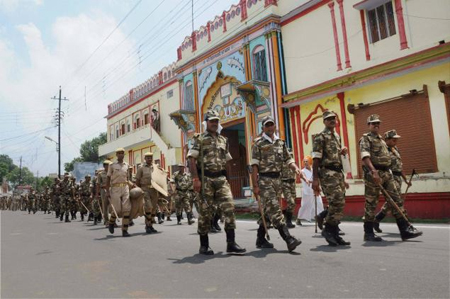 Ayodhya/Faizabad, Aug 24: Ahead of VHP's yatra from Ayodhya tomorrow, the Faizabad administration today cracked down on the saffron organisation arresting 50 of its activists and issuing arrest warrants against 300 members of the outfit.
Ayodhya/Faizabad, Aug 24: Ahead of VHP's yatra from Ayodhya tomorrow, the Faizabad administration today cracked down on the saffron organisation arresting 50 of its activists and issuing arrest warrants against 300 members of the outfit.
Amid heavy deployment of police force in the twin towns, a team led by the Faizabad DM and SSP also carried out searches at VHP's local headquarter Karsewak Puram, Mani Ram Chawni, the temple of VHP leader and president of Ram Janam Bhumi Trust, Mahant Nritya Gopal Das and about half a dozen suspected hideouts of VHP's activists in and around Ayodhya.
The yatra has been banned by the Uttar Pradesh government over possible communal flareup.
The district administration, which had earlier issued arrest orders against 70 prominent VHP leaders, has now issued warrants against 300 more leaders.
"We are conducting preventive arrests of prominent VHP leaders who might create law and order problems in the name of banned 84-Kosi Parikrama yatra," Faizabad District Magistrate Vipin Kumar Dwivedi said.
"First we had issued arrest orders for 70 VHP activists and now 300 more have came on our target. Those arrested will be detained at temporary jails, and will be booked under section 144 of CrPC," he said.
Ashok Singhal, Pravin Togadia and Ram Vilas Vedanti were among the leaders against whom the warrants were issued yesterday.
Faizabad SSP K B Singh said 50 people have been taken into custody.
The VHP has proposed to take out Chaurasi Kosi parikrama yatra between August 25 to September 13 to push for Ram temple at the disputed site. Samajwadi Party government has denied permission for the yatra.
The yatra will travel through six districts, including Faizabad, Basti, Barabanki, Gonda, Bahraich and Ambedkar Nagar.
The district administration is expecting about 40,000-50,000 VHP activists to take part in the 84-kosi Parikrama yatra.
The Uttar Pradesh government has sought help from neighbouring states in intelligence-sharing on the movement of activists of the saffron outfit.
"Neighbouring states have been asked for intelligence sharing in wake of the proposed 84 kosi yatra of VHP on August 25," R K Vishwakarma, IG, Law and Order had said.
Asked if the borders of the district would be sealed, Vishwakarma had said a decision would be taken depending on the situation but for now anyone can visit the city.
"Only those going for the yatra will be stopped," he said, but did not elaborate how they would identify such people.
Vishwakarma said besides 13 companies of PAC and three company of RAF, two Superintendent of Police (SP), 19 Additional SPs, 42 Deputy SPs, 135 inspectors, 430 sub inspectors and 1,300 constables have been deployed in Faizabad.
Chief Minister Akhilesh Yadav had yesterday met legislators of Faizabad and adjoining districts and taken stock of the situation there.
The legislators were asked by Yadav to keep an eye on the situation and apprise the party and him about the ongoing developments in the area.
Though there was no restriction on movement of people in Ayodhya, all vehicles leading to Faizabad are being checked to restrict movement of VHP leaders for the yatra.
"Kya bataein...ye sab rajniti hai jisme hum garibon ko pareshani uthani padti hai. EK din bhi curfew lag jata hai to khana nahi naseeb hota" (All this is politics in which we poor have to suffer. If curfew is imposed for a day, we hardly get anything to eat), said Chhotu, who runs a roadside tea stall in Ayodhya.
Similar were the views of Rizwan Ali, who said there is no problem in the city, which is known for brotherhood between Hindus and Muslims.
"The yatra and temple issues are being raked for political reasons...and the worst hit is the common man like us", he said.
Meanwhile, over 40 sadhus were taken into police custody when they were proceeding to Ayodhya from Jaipur, shortly after their bus crossed into Agra district at Chauma Shahpur village on the UP-Rajasthan border, police said today.
46 sadhus were taken into custody in the wee hours today at around 1.45 AM, Additional District Magistrate of Kiraoli tehsil Radha Chauhan said.
The action comes in the wake off an information provided that sadhus would be crossing into Agra district from Rajasthan in order to proceed to Ayodhya for the Parikrama, Senior Superintendent of Police Shalabh Mathur said.
The sadhus were pushed around and misbehaved with by the policemen and hence they decided to protest and sit on a dharna, Harishankar Das Upraiti, one of the leaders of the group, alleged.
Some sadhus claimed that about 20 of their colleagues had managed to give the slip to the police and would try to reach Ayodhya for the 80 Kosi Parikrama yatra.
Meanwhile, Hindu organisations have criticised the arrest of the sadhus and expressed anger at the treatment meted out to them by policemen.





Comments
Add new comment